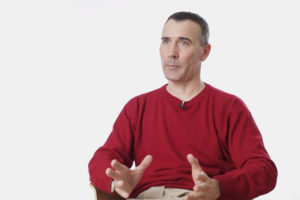Modern Nationalism
Historian Richard Bourke on the components of nationalism, national identity, and the role of ideology and the...
Of course ethics is not just one topic and the philosophy of ethics is not just one topic. And perhaps it is best if we divide it into three different areas. One area that philosophers are interested in is the status of ethical statements. Are they objective? If I say « It’s wrong to murder », is it an objective statement or is it a subjective statement? And if it’s subjective, what does that mean? Is that just a matter of opinion? Is it just my opinion? And if somebody else disagrees with me, that’s just a difference of opinion and there is no fact of the matter to a certain who is right and who is wrong? This is probably the toughest part of the philosophy of ethics and people disagree about it’s status and how to try and ground ethics in some kind of objectivity.
Clearly, ethical statements are not like statements about the physical world. If I say that chair over there has got four legs and a back to it so those are all the things about that chair that one contests, and one can go into a laboratory, and one can measure that legs and one can see that it has a back to it. And one can imagine, of course, if one leaves this room that chair will still be there and it’s not dependent upon human beings for it’s existence. But morality is dependent on human beings. There is no sense that there could be morality if there were no human beings or at least sentient creatures. We could make no sense of morality without any humans on the planet.
There is no morality on the moon, on planet Mars because there are no sentient creatures there. So we need human beings to have morality.
So that’s clearly a difference here between morals and a kind of a physical world. And one question is: how do we make sense then of morality being objective? If you ask students this often their first reaction is to say: « Oh, morality is just a matter of opinion, it’s just my opinion ». But actually most people don’t believe that. And if you then listen to them during the course of the day though get involved in a heated debate about morality, and it makes no sense to have a heated debate about morality unless you take it seriously, unless you think that you are wright and somebody else is wrong (the way it’s about politics and so also to the topic). People actually believe that there is a right answer and that somebody else who disagrees with them is wrong in some kind of important sense and it’s not just an opinion.
Another big area of moral philosophy is how we should live. And that makes sense traditionally to divide ethics into three areas, another three different broad approaches. Some people think that the boundaries are not as strict as other people but traditionally how we should live and how we should act has been divided into three different areas. There is a tradition going back all the way to Aristotle, to a half thousand years, which is that what’s important is character and one should act in a way that a good person would act and one should be generous in a way generous person would act and we should exhibit the virtues of a virtuous person. A morality is to be understood in terms of character.
There is another approach which has it’s roots in Kant, the 18th century and Immanuel Kant who was born in Konigsberg. Kant believes that we should act according to a certain set of moral rules and we shouldn’t transgress those rules, we should act in accordance with how everybody else would act. It has often been compared to the Golden rule and some elements of Christianity have things in common with Immanuel Kant. And I guess there are examples like lying or promise keeping. You shouldn’t lie because you should act in a way that everybody else should act and you can’t possibly wish that everybody lies, you should keep your promises and so on. And I guess, the tradition of human rights that we have in the world at that moment owes a lot to Immanuel Kant and to what is called deontological ethics as they are understood by a set of norms that shouldn’t be transgressed. Torture is an example. You shouldn’t torture people no matter what the consequences are. And all sorts of other human rights are grounded in Immanuel Kant’s philosophy really. And I think we probably have Immanuel Kant, nobody realizes this, but probably we have Immanuel Kant to thank for a modern conception of human rights.
Sometimes if necessary it might be the right thing to do to torture somebody if there is a bomb about to be detonated and the it’s the only way you can find out where the bomb is, and there might be a thousand of lives as stake.
So those traditions are in conflict, they give different answers really about how we should act in certain circumstances. There are ways of trying to make them coincide. I mean, I thing that most of us probably have strongly Kantian deontological instincts rather than utilitarian instincts so that we on a whole don’t think that consequences are all that matters. But often we can take quite more tolerant view about government, for example, so that where individuals interacting we have quite Kantian attitudes and we thing that it’s appalling if individuals treat each other in a norm deontological viewpoint. We are slightly more magnanimous and generous spirited when it comes to the government. We think: «well, maybe the government might need to have to lie in order to gain a greater good and the government has our all interests in common». So that’s an intuition that some people share.
Anyway, that was the second of two big categories, I have talked about meta-ethics, I’ve talked about these different approaches about how lo live. And then there is another part of ethics which is very practical, which doesn’t look at principles by which we live our lives. In draws on Kant, in draws on Aristotle and in draws on John Stuart Mill but it looks very particularly at issue that calls us to disagree in contemporary life. And so it might, for example, look at debates about abortion, it might address issues about capital punishment, euthanasia, all sorts of areas of a moral world that people disagree about. And philosophers have had a lot to say about all those areas.
Charity is another example. Who we should give to and how much we should give to? Again, it draws on those traditions that I was talking about, so a utilitarian, for example, would say that we are as much responsible for what we fail to do as for we actually do.
And one of the implications of that is that if we fail to give to people who are, for example, dying in Third World, we are just as responsible for that as if we would actually sent them poison. If all that matters is the consequence, so we can draw no distinction between acting and failing to act.
And I think one of the ways in which philosophy can help and moral philosophy can help is to shortcut that process and to help people think about these new developments and to wonder whether they are the things we should object to or not. Ans sometimes there might be the things we should object, sometimes there might be developments in science that may be developments in some kind of weapons that we think are abhorrent and should be stopped or controlled.
And in other times we might think: « Well, even if your initial reaction is disgusted, actually if you think about it more carefully, well, who is harmed? And does it lead to more inegalitarian society? » If nobody is harmed, if it doesn’t lead to more inegalitarian society, what could be the objection to it? And let’s try and pinpoint why it might be wrong. And we might find nothing to object to and we might think that despite our instinctive initial response to it, an objection to it, in fact this is something that we should be neutral about or, indeed, we should embrace. So I think that’s another area that philosophers can in fact be quite useful.

Historian Richard Bourke on the components of nationalism, national identity, and the role of ideology and the...

Communication scholar Grant Kien on intercontinental ballistic missiles, critical geography, and John Locke

Philosopher and sociologist of science Steve Fuller on the blurred distinction between true and false, fake ne...